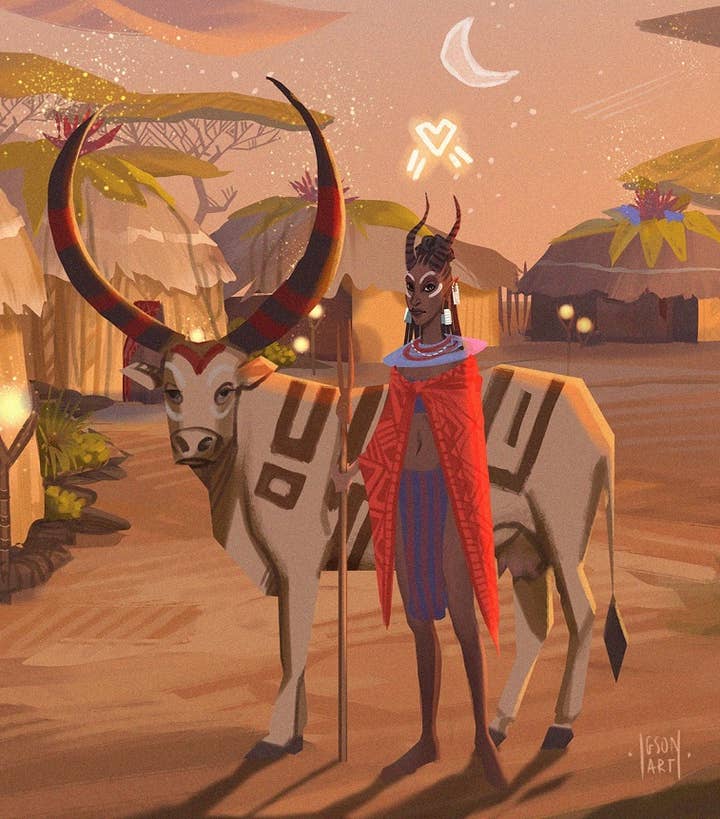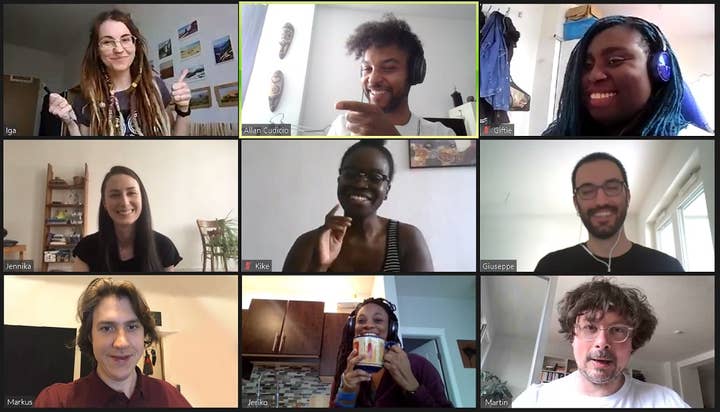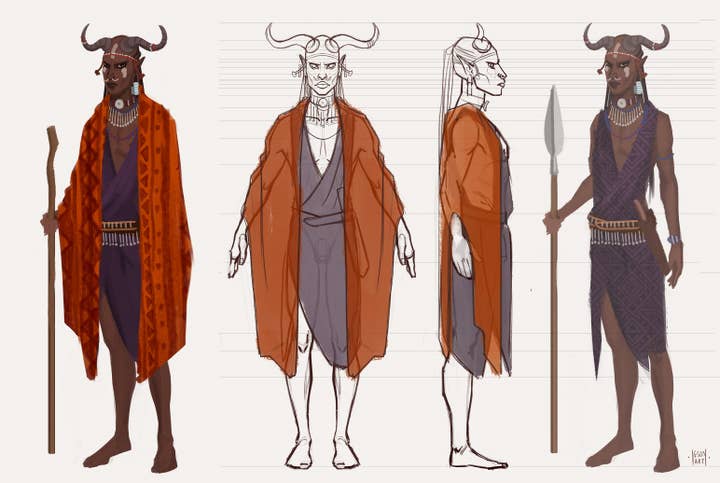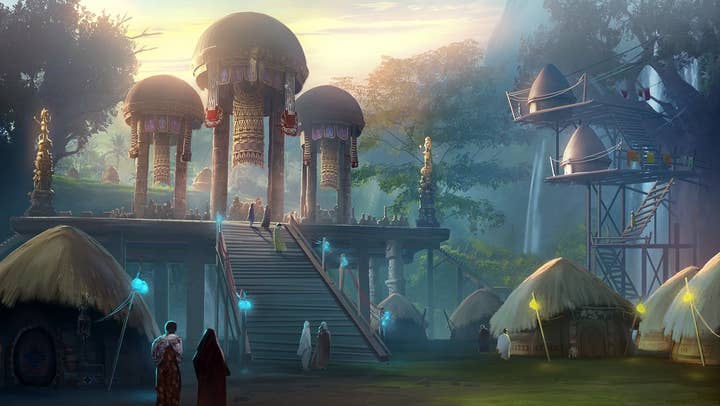Allan Cudicio playing to the beat of his own drum
How Twin Drums is creating an Afrofantasy MMO to dismantle fantasy, professional and industry norms
Referencing developers from the African continent traditionally conjures up images of auteurs such as Eyram Tawia, Sidick Bakayoko, Olivier Madiba, and Sithe Ncube -- creators and pioneering figures reared and intertwined within the continent's nascent but blossoming gaming community.
However, a new breed of games industry professionals is emerging with a deeply rooted connection to the continent along with one foot in the Western gaming eco-system. Allan Cudicio is one such professional.
Queer, Black, and with an unassuming demeanor, Cudicio is a fluid-thinking game designer of contradictions. He is the co-founder of Twin Drums, a game studio developing The Wagadu Chronicles, an MMORPG with an Afrofantasy setting.

The Afrocentric role-playing game path is a well-worn one. Cameroonian Kiroo Games garnered a lot of international attention with Aurion: Legacy of the Kori-Odan before securing a publishing deal and inevitably selling the rights for a film adaptation of the game.
More and more developers have attempted or are in the process of applying a coat of African sensibilities to counter the established tropes of Western role-playing games. However, there are a few factors that might give Cudicio a leg up on his contemporaries.
At the time of writing, Twin Drums had secured €200k financial backing from a German state grant and hoped to at least triple that figure before the end of 2020. That funding came thanks in large part to two experiences etched into the seams of the game's entire development process. First of all, Cudicio is bringing a deep and broad understanding of the role-playing genre to bear on the game, one informed by more than 20 years of Dungeons & Dragons play and MMO community experience going back to Ultima Online.
"Long ago I realized that online 'role-playing' games, built on the mechanics but left out the 'role-play' part, you acting out your character," Cudicio says. "This is such a powerful element of the experience and unsurprisingly most online games have players that endure unsuited mechanics and toxic communities to be able to role-play. Even GTA Online has a strong role-play community. That is incredible."
The ongoing popularity of Dungeons & Dragons, particularly with the rise of third-party tools to facilitate playing the pen-and-paper version of the game online with friends, is evidence enough that the market is missing a video game that taps into the same style of role-playing.
"As a fan of Tolkien and fantasy, I eventually started questioning why Africa was so absent in fantasy or even worse, portrayed in racist ways"
"I understand that AAA developers think such a community is too small (is it?), or have no clue how to manage role-playing servers and that is why the Wagadu Chronicles is unique: both our mechanics and community are being built around roleplay," he stressed.
The other experience Cudicio believes works in his favor is simply being African-European.
"I am half-Ghanaian and I have lived there as well," he says. "As a fan of Tolkien and fantasy, I eventually started questioning why Africa was so absent in fantasy or even worse, portrayed in racist ways. I decided to press the 'reset' button and create a fantasy setting with African history and Blackness at its heart - and which better opportunity to explore this if not a game where players are deeply involved in the setting and want to role-play all aspects of it?
"These two elements, the role-play and the blackness of the game, are not just personal but they deeply strengthen each other. With the market and technology now ready for such a game, I had no choice but to quit my previous job and start working on the game."
Unlike a lot of the developers on the continent who are self-taught, Cudicio cut his teeth in non-gaming software at a small marketing consultancy where he helped game developers improve their KPIs and marketing strategies. He eventually moved into gaming and transitioned into a game designer role at King working on their big puzzle franchises as well as some undisclosed titles. A lead designer role at Wooga soon followed and he was working on more narrative focused games. Getting into the industry just as analytics and live-ops was becoming widely adopted influenced his approach to game design, but he also had other ideas for the way Twin Drums should operate.
"I can say that we are 'diverse' in the true sense of the word," Cudicio says. "Around half are women, a third of colour (African or of African descent) and a quarter queer. We are small -- around a dozen currently -- but most of us have a lot of experience in the industry in many different genres from titles such as Warhammer: Vermintide to Candy Crush. The result is that we always have interesting internal conversations and I love how there is always an unexpected point of view. Many of us have mobile-gaming experience and I feel like this is affecting the development of our PC game in a positive way, keeping things more agile and focusing on early and repeated playables. We have a lot of live operations experience too, which makes me optimistic about the future of Twin Drums."

Beyond being diverse, Cudicio wants the studio's culture to be open as well, with developers regularly getting involved in each other's work.
"It's very important for us to have a clear 'vision keeper' for each area, but then it's their job to manage inputs from others, not to gate that part of development," Cudicio says. "This approach is leading to some great cross-pollination."
The studio is also focused on production practices. In addition to his previous experience, Cudicio has a master's degree in management and a number of the team members also have managerial level experience.
"We value planning and organization; we do not believe in crunch," he says. "This is something we all quickly agreed upon, we do not want Twin Drums to be a short burnout experience but rather a long-term endeavour. I have no doubt it will makes us faster and efficient on the long-term."
That willingness to adopt a non-conformist approach to the company structure is mirrored in their approach to the game's design, which does away with a focus on diverse races -- a common trait in established fantasy IPs -- in favor of lineages.
"The whole concept of fantasy races is flawed," Cudicio says. "It is steeped in old racist theories of people's cultures and personal inclinations being determined by their 'race.' The British empire where Tolkien, father of fantasy, grew up, was a master at this - slicing and categorizing its people into 'races' that had different uses for their masters (e.g. warrior race). Slave traders spoke in a similar way of various types of black people - sadly, fantasy races are strongly reminiscent of this.

"Lineages are a better concept to me. You are a human and your ancestors bestow you with traits but it's not a strictly 'genetic' thing. Even if lineages tend to have cultures, their lines are blurred as people move fluidly; your child might be of another lineage or you yourself might shift at some point. Lineages are more 'ranges' than 'boxes' and two players of a lineage could look and act very different and yet both powerfully embody the beauty of their ancestors."
However, Cudicio admits that adopting a novel approach to the game's design means also trying to overcome a lot of tropes about a game with traditional elements, even going so far as to rail against the perception that Africa is 'tribal.'
"I always remind the team that we are an anti-colonial game, no matter how we look at it"
"Many Africans themselves use the word and it is not always perceived as offensive, but I just never use it, it is too loaded," he says. "Medieval Africa had walled cities, blacksmiths, empires, scriptures, temples, and all the trappings of a 'fantasy' civilization. Colonialism tried hard to destroy these histories and as we work on the game we are fighting back against its lingering effect. I always remind the team that we are an anti-colonial game, no matter how we look at it."
One big assumption he wants to avoid is that African-inspired media is only intended for people of colour.
"The world is a better place when people of all backgrounds experience each other's cultures," Cudicio says. "People should be open to try different things just as it happened when Japanese culture became mainstream.
"Something I would like to highlight is the diversity of African cultures. Africa is often portraited as one block but there is so much beauty and variety. The Wagadu Chronicles draws inspiration from many different cultures across the continent and I hope players will appreciate this and expand their perception of fantasy."
Despite his grand designs, translating and conveying a game of such scale to a diverse team had to be tackled in the most literal sense.
"We organically came up with this rule that when in the game, even when we test things in the server, we tend to speak in-character to each other," he says. "To be honest I was surprised by how easy this was for everyone. If you think about it, role-play is the most natural game for all children - it is just that most of us stop as adults."

In an industry that is uniquely averse to change and new insights, securing funding has been a challenge.
"It has been fascinating for me to see how some 'get it' and some just do not... I have been told to think harder of 'middle-aged white demographics,' among various feedback; luckily others have seen potential future trends in the game and with these people I am having interesting conversations."
Cudicio says he's hoping to wrap up funding talks soon with an unspecified party who shares the team's vision. In the build-up to the games eventual release, he hopes to release a pen-and-paper adventure, which will be quickly followed up with the first in-game footage and trailers.
In an age where the need for more diverse voices, ideals, stories, and experiences has never been greater, Cudicio and his vision for The Wagadu Chronicles promises an experience that goes against the grain whilst readdressing what we perceive to be the norm from a studio perspective.
"I hope with The Wagadu Chronicles, we can help Afrofantasy go more mainstream and to create more online spaces for role-playing," he says.
As for advice he would give developers across the continent looking to make an imprint on the industry, Cudicio kept it simple.
"Focus on quality. If in doubt, always shrink the project and improve quality. You will always be judged by international benchmarks, no matter what."
Vic Bassey is the editor of Games Industry Africa. He also currently works for Raw Fury and has previously held positions with Might and Delight AB and Paradox Interactive, among others.